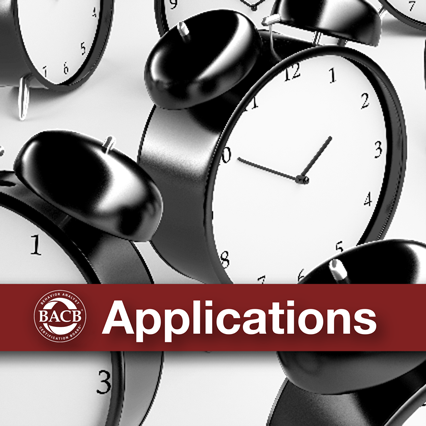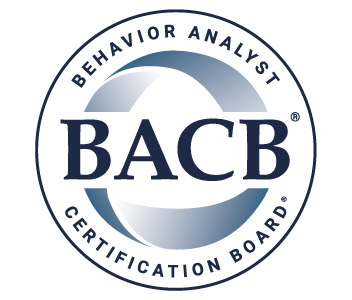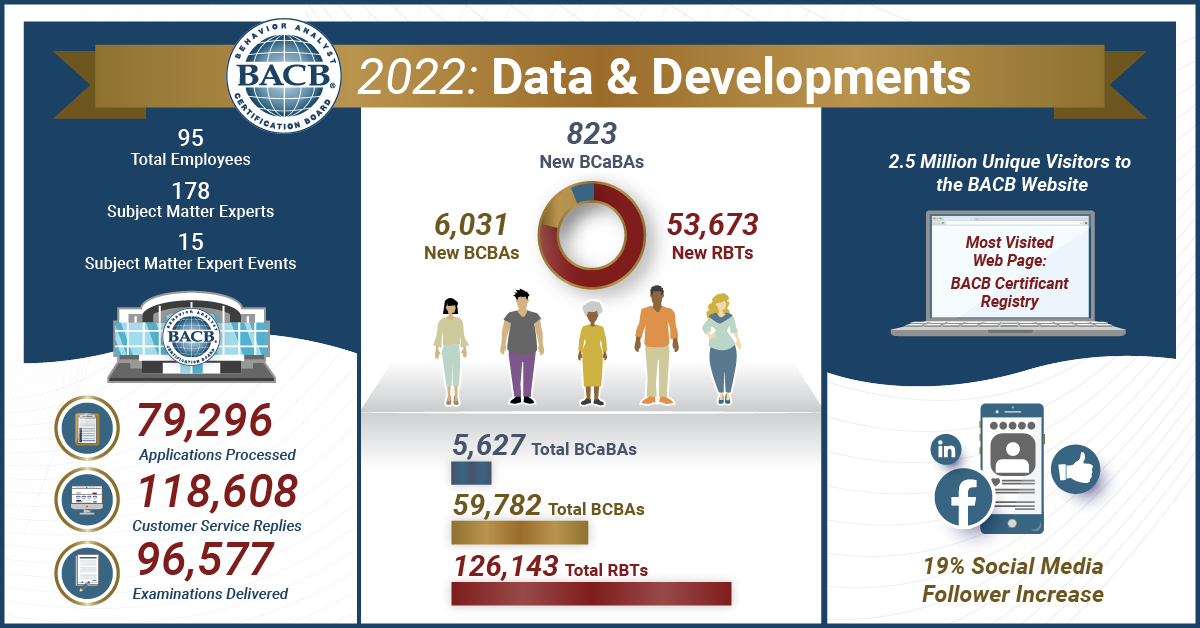New year, new data. Review this collection of important BACB milestones in 2022, and remember—we couldn’t have done it without you. Here’s to another bright year ahead.
Author: BACB NEWS
Now Available: 2021 BCBA and BCaBA Examination Pass Rates for Verified Course Sequences
The BACB has compiled 2021 pass rates for first-time BCBA and BCaBA examination candidates in university training programs with ABAI Verified Course Sequences. The data are sorted alphabetically by university, by the percentage of passing candidates, and by the volume of candidates from a given program.
PsycInfo Database Now Available to BCBAs and BCaBAs
We recently added the PsycInfo database to the ProQuest search engine available to BCBAs and BCaBAs through the Resources tab in their BACB accounts. In addition to the ERIC database, ProQuest now pulls from PsycInfo, the most comprehensive database for psychology and behavioral sciences. BCBAs and BCaBAs can now more effectively search for literature on a particular topic.
5 Must-Know RBT Application Tips

UPDATED: August 25, 2025
Whether you're submitting an RBT Initial Certification Application or completing your RBT Recertification Application, we understand that time is of the essence. We want you to have all of the information you need for a quick and painless application experience. That way, you'll feel well-equipped to move forward with your application and to achieve your goals as an RBT.
So, before you click Submit, read ahead for tips on getting started, creating and/or maintaining your BACB account, thoroughly reviewing your documentation, and understanding the key differences between an RBT Initial Certification Application and an RBT Recertification Application.
Tip #1: Consult the RBT Handbook
For all RBT applicants, new or recertifying, the RBT Handbook should be your go-to resource. In it, you'll find helpful information about eligibility requirements, the application process, and requirements for recertifying as an RBT. We also suggest reviewing the handbook with your RBT Supervisor or RBT Requirements Coordinator, as they can help answer any questions you might have.
Tip #2: Give yourself enough time to prepare
This is vital! Because there are many moving parts in the application process, giving yourself ample time to prepare is one of the best things you can do. If you plan accordingly, you'll have all the time you need to carefully review your materials, which may prevent application errors that cause processing delays beyond the standard 2-week timeline. This is especially important if you're submitting an RBT Recertification Application. For specifics, check out the following application timelines:
Wondering when you'll hear back about your application? You can see current application processing times on the Application Processing Updates web page.
Tip #3: Create and/or maintain your BACB account
Your BACB account is the doorway to your certification, and that certification belongs to you and only you. That said, here are a few things to keep in mind when creating and/or maintaining your BACB account:
- Create your BACB account yourself. Don't have anyone, including your future RBT Supervisor or employer, create an account on your behalf.
- Don't use your work or school email address when signing up. If you use your work or school email address to sign up, you may lose access to your BACB account if you lose access to that email address in the future. It's always best to sign up using a personal email address.
- Reach out to the BACB for assistance. If you lose access to your account for any reason, let us know through the Contact Us Form, and we'll help you access your existing account. Please do not create a new account.
- Keep all of your information current. If your address, name, or other personal information changes, be sure to update your account right away.
- Add bacb.com to your email contacts and safe sender list. This way, you can ensure that you'll receive important messages. Also, be sure to check your spam folder periodically, especially if you're waiting to hear from us.
Tip #4: Carefully review your documentation
When you're eager to submit an application, it's easy to accidentally forget a key piece, like a document, attestation, or signature. The problem is that a missing piece can make the application process not-so-easy. If documentation is missing, incorrect, or does not indicate that you meet the necessary requirements, you'll experience delays in processing times, as the review process starts over each time you resubmit.
To avoid delays as best you can, consider reaching out to your current or future RBT Supervisor or RBT Requirements Coordinator for additional support—and make sure to review these essential documentation requirements:
| RBT Certification Application | RBT Recertification Application |
|---|---|
|
|
| Note: There are 2 versions of the competency assessment. Please refer to the label at the top of the document to ensure that you're using the correct one. Initial Competency Assessments will not be accepted for a recertification application, as Recertification Competency Assessments require the completion of 5 tasks instead of 3. |
Tip #5: Sit back and relax
When it comes to submitting an RBT Initial Certification Application or RBT Recertification Application, we understand how important it is for you to get an approval as soon as possible so that you can take the next steps in your RBT journey. By following this guidance and enlisting the help of your supervisor, you'll feel confident that you can submit an approvable application in no time. And don't forget—we're rooting for you!
Thank you for taking the time to check out these pointers. For more RBT-related resources, visit our Registered Behavior Technician web page. For questions, please reach out via the Contact Us Form.
James E. Carr, PhD, BCBA-D, ICE-CCP

James E. Carr, PhD, BCBA-D, ICE-CCP
James E. Carr, PhD, BCBA-D, ICE-CCP is the Chief Executive Officer of the Behavior Analyst Certification Board. His professional interests include behavior analyst credentialing, practitioner training, behavioral assessment and treatment of developmental disabilities, and verbal behavior. Dr. Carr has published over 150 journal articles on these and other topics and his work has been cited over 8,000 times. Dr. Carr is a Fellow of the Association for Behavior Analysis International and has received awards from APBA, APA’s Division 25, and Autism Speaks.
2026 BCBA and BCaBA Certification Requirements Pushed to 2027
Based on feedback from university faculty, we have decided to push back the implementation of the 2026 BCBA and BCaBA certification requirements until 2027 to give universities more time to prepare for the changes. Please note that the rolling 10-year limit on BCBA and BCaBA coursework will still take effect in 2024, and the new BCBA and BCaBA examinations will still be implemented as planned in 2025. See the updated March 2022 BACB Newsletter for details.
Click the timeline to enlarge, or visit our Recent and Upcoming Changes to BACB Requirements page to view updates.
FAQs About the 2023 International Changes

On January 1, 2023, a number of changes to our international focus that we first announced in December of 2019 went into effect (see Recent Changes to the BACB’s International Focus). To help you navigate these changes, we’ve answered several of your key questions. Let’s address the most important one before we get started:
Who might be affected by these changes to the BACB’s international focus?
These changes primarily impact new BACB applicants and current BACB certificants, supervisors, trainers, and faculty members who work and/or reside outside of the following authorized countries: the United States (US), Canada, Australia, and the United Kingdom (UK).* If this describes you, read on to find out how you might be affected.
Applying for BACB Certification
Q: I understand that as of January 1, 2023, new BACB certifications are only available to residents of authorized countries. Who’s considered a resident?
A: To be considered a resident of an authorized country, you must physically reside in the US, Canada, Australia, or the UK. The BACB will confirm that you’ve met this requirement by checking the address listed in your BACB account. The BACB may also verify your residency by requesting additional documentation, such as your government-issued identification, work records, driver’s license, or utility bills from the time of application. Please note that using a false or temporary address to wrongfully meet this requirement may lead to the invalidation of your eligibility or certification.
Q: I earned my degree outside of an authorized country and then moved to an authorized country. Will I meet the degree requirements when I apply for certification?
A: It depends. The fact that you earned a degree outside of an authorized country doesn’t necessarily disqualify you from becoming certified if you now reside in an authorized country. If your degree meets the degree requirements in effect at the time of application, it likely qualifies. Visit the BCBA or BCaBA Handbook to explore our current degree requirements.
Q: I completed my coursework and/or fieldwork outside of an authorized country and then moved to an authorized country. Will I meet the coursework and/or fieldwork requirements when I apply for certification?
A: It depends. So long as your coursework and/or fieldwork meets all of the requirements in effect at the time of application (regardless of where it was completed), it should qualify. Please review the BCBA or BCaBA Handbook for a full breakdown of current coursework and fieldwork requirements.
Note for those completing VCS coursework outside of an accredited educational institution: Coursework from a Verified Course Sequence approved under an Alternative Pathway in which courses are taught outside of an accredited educational institution must have been completed before January 1, 2023.*** As of July 1, 2023, the BACB will no longer accept non-university coursework. Any individual who wishes to pursue BCBA or BCaBA certification with coursework from such a VCS must submit a fully approvable application** by June 30, 2023.
Residing or Practicing Outside of Authorized Countries
Q: I’m already certified, but I don’t reside in an authorized country. Is my certification still valid?
A: Currently, yes. However, please keep in mind that as countries develop their own professional programs and/or as laws change, certificants in authorized and unauthorized countries may be impacted.
Q: I’m already certified, but I don’t reside in an authorized country. How should I refer to my certification after this date?
A: Since you are already certified, you may continue using and referring to your certification as you have previously.
Q: My certification has lapsed, and I don’t reside in an authorized country. Can I still qualify for certification via the past certification option?
A: No. If your certification has lapsed, you must be a resident of an authorized country to apply for a new BACB certification.
Q: I don’t reside in an authorized country. Can I apply for the doctoral designation?
A: Currently, you may apply for the doctoral designation if you hold an active BCBA certification. Subject to local laws and regulations and where feasible, the BACB will continue to accept doctoral designation applications from any active BCBA regardless of whether they are in an authorized country. Should laws or feasibility change, affecting our ability to offer the doctoral designation to unauthorized countries, the BACB will give the profession a year’s advance notice. Shorter notice may be necessary in regions subject to US business/trade sanctions.
Q: I’m an active BCBA or BCaBA consulting in another country. Can I continue consulting?
A: Yes, you may continue consulting.
Serving as a Supervisor or ACE Provider
Q: I’m an RBT or BCaBA and a resident of a country in which new BACB certifications are no longer available. Can I receive supervision remotely from a certificant in another country, regardless of whether that country is authorized?
A: Yes, as long as the supervision meets all of the applicable supervision requirements in effect at that time.
Q: I’m a certificant and a resident of a country in which new BACB certifications are no longer available. Can I provide RBT or BCaBA supervision remotely to someone in another country, regardless of whether that country is authorized?
A: Yes. However, you must adhere to the Ethics Code for Behavior Analysts to ensure that your supervision is effective. You must also make sure that you and your supervisees comply with all BACB supervision requirements and any other relevant laws and regulations where supervision occurs (e.g., where the supervisor, supervisee, and client are located).
Q: I’m one of the only BCBAs in the country in which I reside. Is there a limit to how many RBT or BCaBA certificants I can supervise?
A: While there is no definitive answer to this question, we encourage you to consider Section 4.03 of the Ethics Code for Behavior Analysts, which requires behavior analysts to only take on a number of supervisees and trainees that allows them to provide effective supervision and training. This means that your supervisory volume must not impact your effectiveness or your ability to meet the RBT or BCaBA ongoing supervision requirements detailed in the Ongoing Supervision sections of the RBT and BCaBA Handbooks. For example, you need enough client knowledge to inform the RBT or BCaBA’s work, provide direction, and contract with any client to whom the RBT is providing services.
Q: I do not reside in an authorized country. Can I apply for or maintain ACE Provider status?
A: Yes, so long as you meet and comply with all of the requirements detailed in the ACE Provider Handbook.
Thank you for taking the time to learn more about these recent and upcoming international changes. We hope that you find this information helpful. For further guidance, visit our International Development & Support web page. If you have any questions, please reach out through the Contact Us Form.
*Individuals who reside in the UK may continue to apply for BACB certification through 2025. This date may be moved earlier if the UK Society for Behaviour Analysis achieves national recognition for UK behavior analysts, develops its own credentialing system, and transitions current BACB certificants into the new UK system.
**An approvable application is one that contains all of the necessary elements for approval. For example, an approvable BCBA or BCaBA application would include the following:
- payment in full
- complete and accurate documentation showing that all fieldwork and coursework requirements have been met
- proof of an acceptable degree that meets all applicable requirements, including official transcript(s) with conferral dates
- a degree equivalency evaluation if applicable
***When coursework is no longer acceptable, it may not be used to mark the onset of fieldwork.
Commonly Asked Questions About BACB Supervised Fieldwork Requirements

UPDATED: December 30, 2024
When our subject matter experts designed the BCBA and BCaBA supervised fieldwork requirements, they had one person in mind:
You.
The requirements had to accommodate the countless circumstances in which you deliver—or help deliver—behavior-analytic services. They also needed to set minimum expectations that could help guide you and your supervisor as you create the most valuable practical experience for you, your professional path, and the clients you serve. When trying to check all of these boxes, the subject matter experts realized that flexibility is key.
However, we understand that with flexibility comes uncertainty. It can be frustrating when you ask us whether something counts toward a requirement, and we respond with, “It depends.” That’s why we rely on supervisors to understand our requirements and make judgment calls based on the context of your unique situation. By working closely with your supervisor, you can develop fieldwork that meets our requirements and your career goals so that you can become a well-rounded, certified behavior analyst who serves clients to the best of their ability.
To help ensure that you’re headed in the right direction, we answered some of your most frequently asked questions about fieldwork. Please review these Q&As, the Considerations When Identifying Practical Fieldwork Opportunities section of the BCBA or BCaBA Handbook, and our Documenting Fieldwork blog and video for details.
Q: How do I know whether an activity counts toward my fieldwork hours?
A: First, review the list of Acceptable Activities in the Supervised Fieldwork Requirements section of the BCBA or BCaBA Handbook. Then, ask your supervisor. They are ultimately responsible for determining whether an activity meets our fieldwork requirements, lines up with your professional goals, and helps you develop the skills you need to demonstrate competence in behavior analysis.
Q: What’s the difference between restricted and unrestricted activities?
A: Let’s break it down:
| Type of Activity | Definition | Details |
|---|---|---|
| Restricted | An activity that involves the delivery of therapeutic and instructional procedures directly to clients. | These activities are optional and must not make up more than a certain percentage of your fieldwork hours. See the BCBA or BCaBA Handbook for details. |
| Unrestricted | An activity that best exemplifies the work of a behavior analyst who oversees and develops programs and systems for others to implement. | These activities are required and must make up a certain percentage (or more) of your fieldwork hours. See the BCBA or BCaBA Handbook for details. |
Whether an activity is restricted or unrestricted depends on context. For example, data collection could be a restricted activity if you’re solely collecting as part of a client’s treatment program. It could also be an unrestricted activity if you’re collecting as part of a functional assessment to identify a client’s future programming needs. Per usual, your supervisor can help you determine which category your activity falls into.
Q: How should I structure my restricted and unrestricted activities?
A: It’s up to you and your supervisor. Trainees are not required to accrue restricted hours, but they are required to accrue unrestricted hours so that they’re fully prepared to do everything a certified behavior analyst does. This leaves room for many different approaches. Some trainees begin their fieldwork with primarily restricted activities, and others jump right into both, especially if both types are relevant to a client’s programming.
Q: Do I have to see people in a clinical setting for them to be considered clients?
A: A client is anyone (i.e., a person or a group of people) who receives behavior-analytic services in any setting. For example, a client might be an older adult in an assisted living facility or a group of employees in a corporate office. If you’re ever unsure, ask your supervisor. They can determine who is considered a client and who isn’t.
Q: Can the observation with a client and supervisor-trainee contact requirements be met at the same time?
A: It’s up to you and your supervisor. (Do we sound like a broken record yet?) But there’s a catch. For the benefit of you and your clients, supervisor-trainee contacts must happen in real time. For example, if your supervisor watches an hour-long video of you delivering services but does not provide immediate, real-time feedback, that hour could count toward the observation with a client requirement but not the supervisor-trainee contact or total supervised hours requirement. If you and your supervisor watch the video together, pausing to discuss feedback and behavior-analytic principles, the hour could count toward all requirements at once.
Q: Can the BACB tell me whether a certain activity will count toward the requirements?
A: No. You’ll need to work with your supervisor to identify the activities you’ll complete and how you’ll categorize them. To help you and your supervisor, check out the table in the appendix of the Fieldwork Checklist and Tipsheet, which includes how to categorize a sample of fieldwork scenarios.
Q: Can I count an observation from a BCBA who isn’t in my supervision contract?
A: No. For your hours to count toward the observation with a client requirement, you and your supervisor must have a supervision contract in place. You may be in contact with other BCBAs not listed in your supervision contract, but those interactions will not count toward your fieldwork hours. That being said, those interactions are not for naught! They might count toward your independent hours.
Note: If you’re accruing fieldwork at an organization with multiple supervisors, please make sure that all of your supervisors are included in your supervision contract and that you’re using the correct Monthly and Final Fieldwork Verification Forms. See our Documenting Fieldwork: Helpful Answers to Your FAQs blog for more information about your documentation system.
Q: I’m working as an RBT or BCaBA as I accrue my fieldwork hours. Can I count the hours I’m working under supervision as supervised fieldwork hours, or is that double dipping?
A: If the hours you work meet all of the fieldwork and RBT or BCaBA supervision requirements, you may double dip. For example, if you have an hour-long meeting with your RBT Supervisor, you may count it toward your supervised fieldwork hours (only if you have an applicable supervision contract in place, your supervisor meets all necessary qualifications, and the meeting’s activities are appropriate for and meet both sets of requirements).
Before you consider double dipping, please keep in mind that there are a number of important differences between BACB requirements. For one, someone who is qualified to be an RBT Supervisor may not be qualified to be a fieldwork supervisor. In addition, there’s a limit on the number of restricted hours that may be counted toward fieldwork hours, and unrestricted activities are likely outside of the scope of an RBT’s responsibilities. Check out 7 FAQs for RBTs Pursuing BCBA or BCaBA Certification for more support for this scenario.
Q: Can I take breaks while accruing my supervised fieldwork hours?
A: Absolutely. Your fieldwork must be accrued within 5 consecutive years, but in that time period, you are more than welcome to take breaks and even change settings and/or supervisors.
Q: I’m going to take a semester off. Can I accrue supervised fieldwork hours during that time?
A: Yes, under one condition: You must have been enrolled in a qualifying behavior-analytic course (that you completed or will complete with a passing grade) before you began accruing fieldwork hours. If this is true, you can accrue hours during a break from school or even after you’ve completed your program and are no longer enrolled.
Q: Can I have one supervisor who provides all of my group supervision and another who provides all of my individual supervision?
A: It depends! (Now we’ve really come full circle.)
If you’re receiving supervision at an organization with multiple supervisors, yes. It’s possible in this situation because one supervisor coordinates all activities, ensuring that the topics and clients covered in individual and group supervision meetings correlate.
If you’re receiving supervision from one supervisor or a few independent supervisors, no. In this case, the same supervisor must provide your group and individual supervision and meet all of the fieldwork requirements independently.
That’s a wrap! (It seems like we’ve finally fixed that pesky broken record.) Thank you so much for taking time out of your day to get familiar with our supervised fieldwork requirements. Before you go, we’d like to share a few important resources to help you get the most out of this blog.
Because BACB requirements are flexible and occasionally change, please visit the BACB website, the Recent and Upcoming Changes to BACB Requirements web page, and the BACB Newsletter frequently. For more information and helpful fieldwork resources, including a full glossary of terms and a fieldwork tip sheet, check out the Supervised Fieldwork section of the BCBA or BCaBA Handbook. Before you apply for BCBA certification, check out the BCBA Application Self-Assessment Tool to help you identify next steps in your journey.
Future Changes to BCBA Certification Requirements
Inside the BACB: Episode 27
In this episode, CEO Dr. Jim Carr and Deputy CEO Dr. Melissa Nosik review upcoming changes to BCBA certification requirements, originally announced in the March 2022 BACB Newsletter.
You can find all of the BACB’s videos on our YouTube channel.
Introducing the 2025 BCBA and BCaBA Test Content Outlines
Inside the BACB: Episode 26
In this episode, join CEO Dr. Jim Carr and Deputy CEO Dr. Melissa Nosik as they discuss the newly developed BCBA and BCaBA test content outlines, which will replace the current BCBA and BCaBA task lists in 2025.
You can find all of the BACB’s videos on our YouTube channel.


